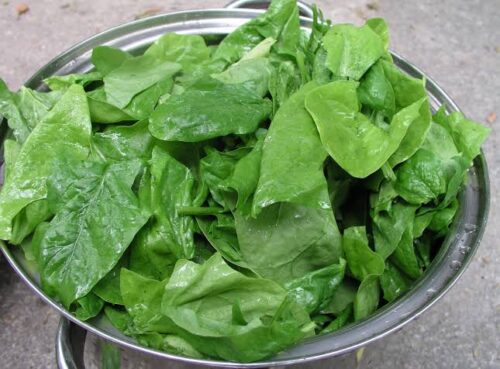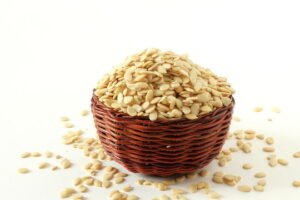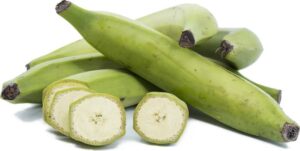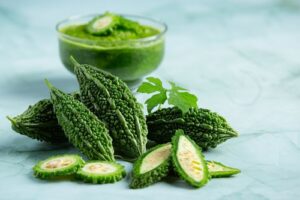Oha leaf (Pterocarpus mildbraedii) is a popular vegetable native to the Igbos in Nigeria.
“Oha” or “Ora” is the Igbo name while the English name is the African Rosewood plant. The plant is medicinal and grows into a huge tree that retains its green leaves throughout the year.
The green leaves are incredibly nutritious and are used in preparing a delicious local soup called Oha/Ora soup.
In this article, you will learn about the nutrition content, health benefits, and culinary uses of Oha leaf.
Nutrition Facts
Oha leaves are rich in essential nutrients and vitamins.100 grams of raw edible leaves contain [1]:
- Energy: 56 Kilocalories
- Moisture content: 85 grams (g)
- Protein: 4 g
- Fat: 1 g
- Carbohydrate: 8 g
- Crude fiber: 1 g
- Calcium: 72 milligram (mg)
- Magnesium: 28 mg
- Iron: 5 mg
- Zinc: 3 mg
The leaves are also rich sources of B-vitamins, vitamin C, and antioxidants. They also contain manganese and copper – two important minerals needed for the proper functioning of cells in your body.
Note: Approximate values were given.
Health Benefits
The health benefits of the leaves include:
Rich in antioxidants
Oha leaves are incredibly rich in antioxidants.
Antioxidants are compounds that help our body fight against free radicals that cause cancer, diabetes, heart disease, and other diseases.
Researchers found that oha leaves contain phenolic acids, lupeol, and benzenediol – important antioxidants that help fight diseases in the body and boost immunity. [2]
May prevent diabetes
Oha leaf is rich in dietary fiber that may help prevent diabetes and lower blood sugar levels.
Studies have found that a high intake of rich-fiber foods like green-leafy vegetables is associated with a lower risk of type 2 diabetes. [3]
So fill-up your plates with green-leafy vegetables like oha leaves.
Promotes digestive regularity
Oha leaf is high in fiber and water. This helps to prevent constipation and promote a healthy digestive tract.
Also, foods high in dietary fiber, are known to prevent colon cancer and other types of cancer. [4]
Improves bone health
Oha leaves are rich in calcium, magnesium, and manganese – three essential minerals required for bone health and development. [5]
And foods rich in essential nutrients and minerals help to prevent bone diseases like osteoporosis and arthritis.
May help fight anemia
Oha leaves are also an excellent source of dietary iron and help prevent anemia.
Iron is needed in the body to help build hemoglobin, which brings oxygen to your body’s tissues and cells.
Additionally, leafy vegetables like oha are highly recommended for pregnant women and women of childbearing age who need high amounts of iron during pregnancy and after menstruation.
How to add Oha leaf to your diet
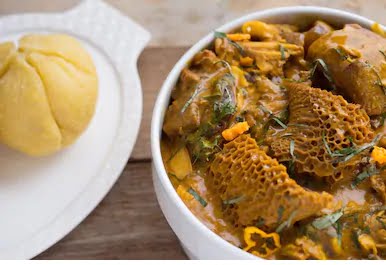
Oha leaves are versatile and can be used in so many recipes. The following are two ways you can enjoy it:
- Tea: To prepare, simply add five or six oha leaves into a cup of boiled water. Allow to steep and cool for five minutes before drinking. You can sweeten it with honey or any other additives.
- Oha soup:
- Ingredients; Ora leaves, uziza leaves, cocoyam or achi powder, palm oil, assorted beef parts, dry fish, seasonings, pepper, and ogiri (local Igbo paste).
- Preparation; Simply cook assorted beef and stockfish in a pot until done. Then add seasonings, cocoyam (thickener), and palm oil in the pot. Allow it to cook for 10 min. Then shred the leaves with your fingers and add them to the boiling pot. Cook for an extra five minutes and your soup is ready. You can enjoy it with wheat meal, fufu, or pounded yam.
Related: Piper guineense (Uziza): Nutrition, Health Benefits, and Uses
Possible side effects
Although more human studies are required, oha leaves have shown no toxicity on animal models and are considered safe to eat. [6]
However, always remember to consume oha leaves in safe doses as it may contain little amounts of non-nutritional compounds like oxalate.
The bottom line
Oha leaf is a nutritious, leafy-green vegetable with incredible health benefits.
This vegetable helps prevent diabetes, cancer, health disease, anemia, and bone disease.
It is highly recommended for the elderly, pregnant women, diabetics, and young children.
Ora is highly versatile and easy to add to your diet. So start enjoying it today!
6 Sources
- Anyanwu C. The health benefits of Oha leaf. Journal of Pharmaceutical Science & Emerging Drugs
- Uchegbu, R. et al. “Identification of Phytochemicals Present in the Leaves of Pterocarpus Mildbraedii Harms by GC / MS Analysis.” (2015).
- Wang, Ping-Yu et al. “Higher intake of fruits, vegetables or their fiber reduces the risk of type 2 diabetes: A meta-analysis.” Journal of diabetes investigation vol. 7,1 (2016): 56-69. doi:10.1111/JDI.12376
- Shankar, S., & Lanza, E. (1991). Dietary fiber and cancer prevention. Hematology/oncology clinics of North America, 5(1), 25–41.
- Palacios C. (2006). The role of nutrients in bone health, from A to Z. Critical reviews in food science and nutrition, 46(8), 621–628. https://doi.org/10.1080/10408390500466174
- Adegbite V. et al. (2017) Effects of ethanol and aqueous extract of Pterocarpus mildbraedii on hematology parameters and cholesterol in albino rats. African journal of biochemistry research. PDF
Get new free and exclusive health tips delivered straight to your inbox!
